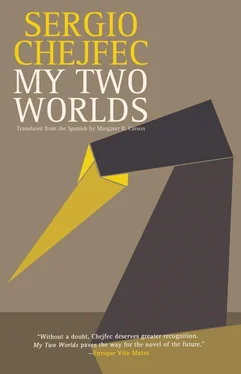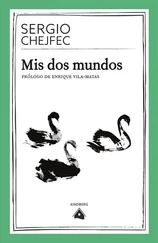I followed the fence until I found the gate, also made of wire and closed with a padlock, where there was a sign saying that on Mondays — that day — it was closed. I looked inside the cages closest to me, which held birds of prey. The cages held two or three birds, each bird well-separated from the others, as if they belonged to different or feuding families, though none were easy to distinguish, perhaps because of the dim light, or their statue-like immobility, which concealed them in the gloom. My eyes picked them out in the shadows, and the first thing I saw were their immense beaks, often in vivid colors and outlandishly shaped, disproportionately large in relation to their heads, though fairly insignificant compared with their bodies, as is generally the case with birds.
These large birds appeared to be asleep or to keep a vigil composed of stoicism and waiting, while they tolerated the visits of individuals lower down the scale who stole in between the bars to eat the food. I was surprised to see a number of sparrows bobbing themselves eagerly over low mounds of ground meat, or meat that had been chopped mechanically into small pieces and spread on long trays. The large birds looked on, unperturbed, at least that was what I supposed, because it was impossible to verify that they were looking at anything in particular. And something else that surprised me was the fact that the sparrows, despite their small build, which would have allowed them to avoid obstacles and fly comfortably between the bars into the cages, crept in slowly, as if they wanted to remain unnoticed, and so make their giant relatives think they belonged to a different species.
The labels with the names of the birds were green with small white letters. The scientific names had a certain morphological resonance for me, but I found the popular names more picturesque, for these were indigenous, or half-adapted, names, which in my imagination recalled divinities or characters from the native mythology, lore that still resonated for the inhabitants of the deep jungles and the great savannas, or had once done so. The only vivid colors to be seen in the darkness were, as I said, the beaks of the raptors and the piles of meat, the former red as well, for the most part, so that one’s gaze fell involuntarily and every so often on those two points.
I was busy verifying these impressions when I saw an older, almost elderly woman who was approaching me from one side, presumably to tell me something. Her hair was graying and she wore loose-fitting clothes, as if she lived near the park and had only to put on a presentable bathrobe to visit. Nonetheless, she carried an elegant pocketbook and another object I can’t identify now, which at the time seemed like a flimsy parcel, made from used paper or plastic bags. When she reached me, she asked why the aviary was closed, she had made a special trip from home and now discovered that she couldn’t get in. I couldn’t think of an answer. My first reaction was to conceal the hand holding the map, because I was afraid she would realize I was a visitor and rule me out as a possible helper.
There was the sign in front of us showing the visiting hours and the day the aviary was closed, but since I was a stranger in town it occurred to me that the sign could be old or that there it was customary to ignore it, and that the neighborhood woman was asking me about something else, a more fundamental matter, or for some news that wasn’t immediately obvious. I was about to tell her I didn’t know, but instead pointed to the sign indicating the aviary was closed, or maybe told her at the same time that I didn’t know; in truth, I don’t remember all that well. Whatever the case, for a brief moment the two of us stood waiting for something to happen. Then, as it tends to occur, there was a screech of a bird from above, half-mixed with the revving of a distant motor. I began to think: the coincidence was too great for the sign to be incorrect; so despite its being my first time in the park and at this aviary, which I would be unable to visit any time soon, or maybe ever, since I planned to leave the city the following day, I once more relayed the first and probably last piece of information I’d acquired on this subject, and I told her that the place was closed on Mondays. By way of argument I pointed to the sign once more.
As has happened to me on other occasions, and continues happening to this day, the woman thought it reasonable to ignore me. Something about the way I speak must cause this; it’s probable that my lack of conviction in saying even the most obvious things, or the things I most believe in, works against me at times. Most likely, I thought, the parcel she’s carrying has food for the birds who spend their entire lives caged and eating nothing but the same old ground meat. She told me she knew it was closed on Mondays. To that I could only insist that today was a Monday. It was a fact I could be sure of despite being a stranger in town, because obviously it was Monday in all of Brazil and the rest of the continent. She stood there thinking, and I noticed how for a fraction of a second she was mentally transported to another place, or another time; she seemed to be taking inventory, and wiping the slate clean. She finally sighed, acknowledging her error, and told me she had made a mistake and would have to go home and come back the following day.
I was more or less convinced that she lived nearby, and from the way she described the operation (have to go home, come back the following day, etc.), it was clear that she treated these visits, which were no doubt frequent, or in any case regular, as events that required preparation and, above all, represented a high point in her daily routine: a duty, a regular habit. That suspicion, if that’s the right word, allowed me to glimpse the net weight of a normal life, of any life, to allude to it in a perhaps condescending manner. The skein of a person’s own acts, whether unnoticed, essential or absurd, which range from the unconfessable to the naïve, from the irrational to the repeated, each with its dose of fear and dignity. I imagined this lady walking through the fairly empty streets of the surrounding area; two blocks before arriving home, she would think about the best moment to take her keys from her pocketbook and clutch them in her fist until she reached the front door. Most likely, I thought, the spot is predetermined: when she passes a certain tree, or crosses at a corner, she looks for her keys, and when she’s found them she removes her hand from her pocketbook. The operation is unconscious, however, just like the “thought” she has before she decides to take out the keys. A thought that is definite and vague at the same time.
I don’t know if any of the birds could have noticed our brief conversation; in any case I’m certain no one saw us, because this area seemed separated from human time, as did nearly the entire park for that matter. On one afternoon quite some time ago, at the end of one of my long days of mechanical strolling, during a period of isolation in which I did nothing but read and walk, as two different and yet sadly related activities — I’d forgotten about work and about the world, which didn’t bother me a bit, though I’d suffer the consequences soon enough — one afternoon I collapsed in exhaustion at the end of one of my long walks, and for something to do I opened the first book that came to hand. Halfway down the page there was a description of a bird’s gaze; and I don’t know if it was due to exhaustion or surprise, to my situation in general or the particular eloquence of the story, but the fact is that I was immediately overwhelmed by suggestibility and fear. The impact was such that I had to stay in for several days, probably frightened I’d run across some bird, even at a distance. Since then I’ve been unable to look a bird in the eye without reliving, more than my fear, the terrifying memory of that moment. Because sometimes the memory of what one has read tempers the actual experience, and the experience itself becomes, more than something physical, the realization of the reading. .
Читать дальше












